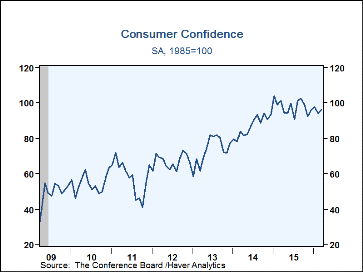 Global| Mar 29 2016
Global| Mar 29 2016U.S. Consumer Confidence Is Stronger Than Expected
by:Tom Moeller
|in:Economy in Brief
Summary
The Conference Board's Consumer Confidence Index during March increased 2.3% (-5.1% y/y) to 96.2 from 94.0 in February, revised from 92.2. The latest figure compared to an expected 93.5 in the Action Economics Forecast Survey. During [...]
The Conference Board's Consumer Confidence Index during March increased 2.3% (-5.1% y/y) to 96.2 from 94.0 in February, revised from 92.2. The latest figure compared to an expected 93.5 in the Action Economics Forecast Survey. During the last ten years, there has been a 70% correlation between the level of confidence and the y/y change in real consumer spending.
A 6.0% rebound to 84.7 (-11.8% y/y) in the expectations reading to 84.7 was behind the rise in the overall index. In contrast, the present situations figure fell 1.3% (+3.7% y/y) to 113.5, repeating its February fall.
Expectations that business conditions would be improved in six months prompted the rebound in the overall expectations index. Expectations for more jobs followed, although a lessened percentage thought that income would improve. To the downside, consumers perception that current business conditions were good fell to the lowest percentage since August. In contrast, the appraisal that jobs were hard to get increased to 26.6% of respondents, the highest fraction since July. The percentage who thought that jobs were plentiful increased to 25.4%, the highest level since just before the recession.
Expectations for the inflation rate held steady m/m at 4.7%, the lowest level since early 2007. Higher interest rates were expected by a sharply reduced 59.8% of respondents.
Plans to buy a new home deteriorated to the lowest level since August, but major appliance buying plans recovered much of the prior month's decline. Intentions to buy a new car declined, however, to the lowest point since July.
By age group, confidence amongst respondents under age 35 rebounded to the highest point in twelve months. Confidence amongst those aged 35-54 years eased to a four-month low, and confidence amongst respondents over age 55 rose slightly. Both of these latter figures remained sharply lower versus last year's highs.
The Consumer Confidence data is available in Haver's CBDB database. The total indexes appear in USECON, and the market expectations are in AS1REPNA.
The Outlook, Uncertainty, and Monetary Policy is the title of today's speech by Fed Chair Janet L. Yellen, and it can be found here.
| Conference Board (SA, 1985=100) | Mar | Feb | Jan | Y/Y % | 2015 | 2014 | 2013 |
|---|---|---|---|---|---|---|---|
| Consumer Confidence Index | 96.2 | 94.0 | 97.8 | -5.1 | 98.0 | 86.9 | 73.2 |
| Present Situation | 113.5 | 115.0 | 116.6 | 3.7 | 111.7 | 87.4 | 67.6 |
| Expectations | 84.7 | 79.9 | 85.3 | -11.8 | 88.8 | 86.6 | 77.0 |
| Consumer Confidence By Age Group | |||||||
| Under 35 Years | 124.5 | 112.1 | 123.7 | -0.3 | 116.0 | 106.6 | 93.1 |
| Aged 35-54 Years | 100.3 | 101.2 | 102.1 | -4.3 | 103.9 | 92.4 | 76.8 |
| Over 55 Years | 81.4 | 80.9 | 83.1 | -9.3 | 84.0 | 73.8 | 61.2 |
Tom Moeller
AuthorMore in Author Profile »Prior to joining Haver Analytics in 2000, Mr. Moeller worked as the Economist at Chancellor Capital Management from 1985 to 1999. There, he developed comprehensive economic forecasts and interpreted economic data for equity and fixed income portfolio managers. Also at Chancellor, Mr. Moeller worked as an equity analyst and was responsible for researching and rating companies in the economically sensitive automobile and housing industries for investment in Chancellor’s equity portfolio. Prior to joining Chancellor, Mr. Moeller was an Economist at Citibank from 1979 to 1984. He also analyzed pricing behavior in the metals industry for the Council on Wage and Price Stability in Washington, D.C. In 1999, Mr. Moeller received the award for most accurate forecast from the Forecasters' Club of New York. From 1990 to 1992 he was President of the New York Association for Business Economists. Mr. Moeller earned an M.B.A. in Finance from Fordham University, where he graduated in 1987. He holds a Bachelor of Arts in Economics from George Washington University.










